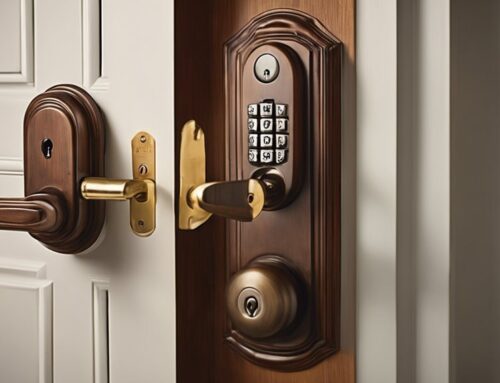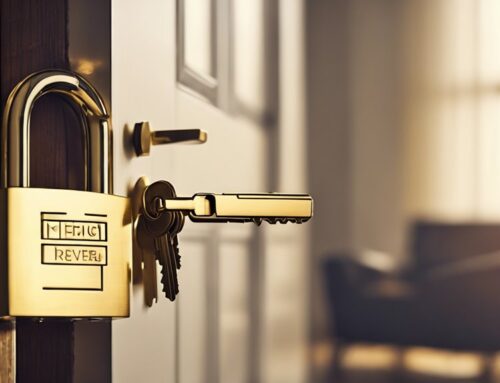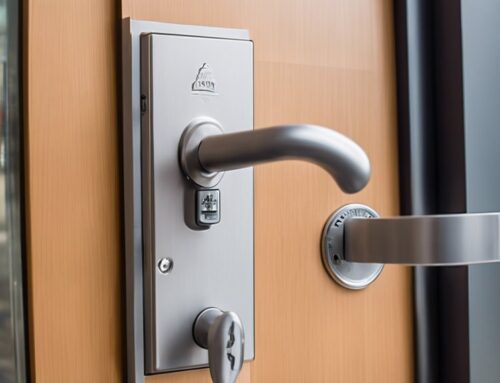If you're considering a career as a locksmith in New Jersey, it is crucial to understand the various employment laws that apply. You'll need to meet age and educational requirements, pass a thorough background check, and maintain liability insurance. Plus, there are specific regulations your employer must follow, such as ensuring proper training and maintaining a physical office. These rules not only protect you but also establish professional standards in the industry. As you navigate these requirements, you might find that some details are more complex than they seem—let's explore what you need to know.
Key Takeaways
- Locksmiths in New Jersey must be at least 18 years old and demonstrate good moral character for licensing eligibility.
- A minimum of three years of hands-on experience or a two-year apprenticeship is required for locksmith licensure.
- All locksmiths must complete a state and federal background check, including fingerprinting, prior to obtaining a license.
- Employees must have a minimum of three years' experience and pass background checks to work independently in locksmithing.
- Continuing education of 24 to 52 hours is required every three years to maintain licensure and ensure compliance with updated regulations.
Eligibility Criteria
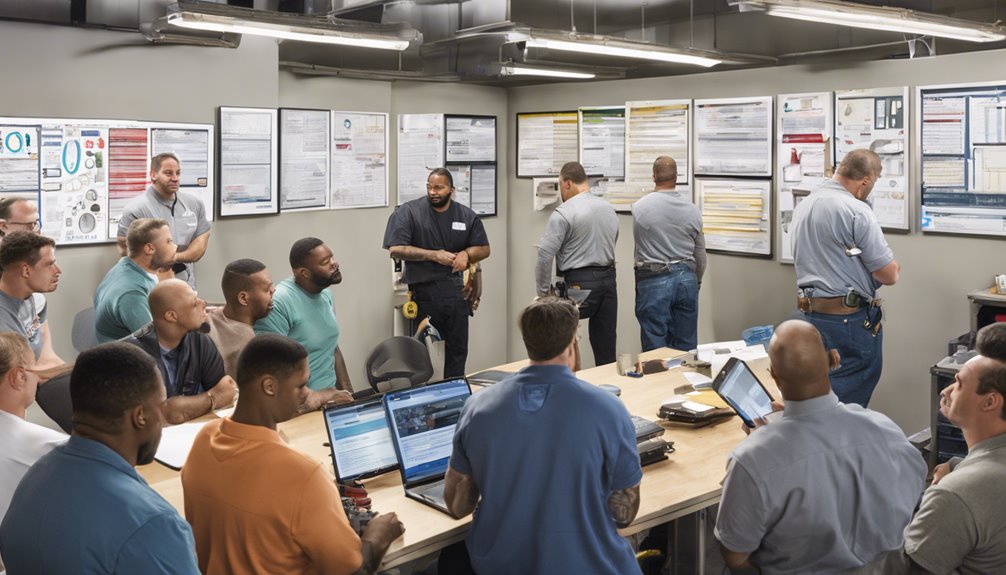
To obtain a locksmith license in New Jersey, you must meet specific eligibility criteria that encompass age, qualifications, and experience. First, you need to be at least 18 years old and demonstrate good moral character as outlined in N.J.S.A. 45:5A-27. Holding a high school diploma or an equivalency certificate is also essential for foundational knowledge in locksmithing. Additionally, you mustn't have a criminal history involving first, second, or third-degree convictions within the last decade, as this can disqualify you from licensure.
Next, practical experience in locksmithing is paramount. You'll need a minimum of three years of hands-on experience, equating to about 5,040 hours, performing locksmithing services. If you satisfy this requirement through an approved two-year apprenticeship program, you may bypass the three-year experience criterion. Moreover, it is important to note that direct supervision is required for all locksmithing services not covered by indirect supervision. The licensing process in New Jersey ensures that locksmiths have both the technical skills and the ethical grounding necessary to provide secure and trustworthy service. Locksmiths should also be aware of key duplication laws in New Jersey, which outline permissions and prohibitions they must follow to stay within legal boundaries.
Importantly, your experience mustn't include supervisory or managerial duties and should involve full-time work, averaging at least 20 working days per month within the prior three years preceding your application.
Lastly, you must successfully complete the necessary examinations and training requirements in various codes and safety regulations relevant to locksmithing. All these stipulations guarantee that licensed locksmiths are well-equipped, both in moral standing and professional capability, thereby enhancing public trust and safety in locksmith services.
Confirm you carefully review these criteria before applying, as thorough compliance is essential for achieving licensure and practicing lawfully in New Jersey.
Educational Requirements

When pursuing locksmith licensure in New Jersey, you must satisfy distinct educational requirements that underpin your professional foundation. First, you need to be at least 18 years old and possess a high school diploma or an equivalency certificate. While a specific college degree isn't required, your educational background must be verified as part of the application process.
Practical experience plays a critical role in your education. You must accumulate at least three years of hands-on experience in locksmithing services, which translates to a minimum of 5,040 full-time hours. Alternatively, if you complete a two-year apprenticeship program approved by the U.S. Department of Labor, that can fulfill this requirement. However, you'll need to note that your experience shouldn't involve supervising or managerial tasks; it should be strictly hands-on locksmithing. In addition to practical experience, it's crucial to understand the legal aspects of lock picking in New Jersey to ensure compliance with state regulations. Lock changes in residential properties are governed by specific laws in New Jersey, which must be adhered to by both landlords and tenants.
Additionally, to align with state regulations, you're required to complete several mandatory training courses. This includes two hours each in the Barrier Free Subcode, the New Jersey Uniform Construction Code, the Americans with Disabilities Act Code, industrial safety, and New Jersey law governing locksmithing services. It's important to recognize that all applicants must demonstrate good moral character as part of their eligibility.
While successful completion of the locksmithing examination is necessary for licensure, pursuing certification programs, though not mandatory, can greatly enhance your professional credibility. These programs often require continuing education to maintain.
Together, these educational requirements form a robust foundation to guarantee you're well-prepared to operate within the field effectively and legally.
Licensing Process

Completing the necessary educational requirements sets the stage for steering the licensing process in New Jersey. To become a licensed locksmith, you'll need to meet specific eligibility criteria, pass examinations, and demonstrate your practical experience. It's also worth noting that licensing requirements differ significantly by state, affecting how you approach the process. Additionally, landlords in New Jersey must comply with lock rekeying laws to ensure tenant security when previous tenants vacate the property. Licensed locksmiths in New Jersey are required to carry liability insurance in adherence to state regulations to protect both the locksmith and the consumer.
Here's a concise overview of the key components of this process:
| Category | Requirements |
|---|---|
| Licensing Eligibility | – At least 18 years old – Good moral character – No serious felony convictions within the last 10 years – High school diploma or equivalency – Criminal history background check required |
| Examination & Training | – Successful completion of locksmithing examination – 2 hours Barrier Free Subcode training – 2 hours New Jersey Uniform Code training – 2 hours Americans with Disabilities Act training – 2 hours industrial safety training |
| Practical Experience | – Minimum 3 years (5,040 hours) of hands-on locksmithing services – Alternatively, complete a 2-year apprenticeship – Experience must exclude managerial roles and be documented with monthly working days over 36 months |
You must submit your application through the MyLicense Online Licensing system, alongside a non-refundable fee of $150. Importantly, you'll also need to confirm your business registration is in order, including obtaining an Employer Identification Number (EIN) and adequate insurance coverage—$500,000 in general liability and a $10,000 surety bond. This process demands diligence, but successfully steering it opens the door to a rewarding career in locksmithing.
Supervision Requirements

While traversing the complex landscape of locksmith employment in New Jersey, understanding supervision requirements is essential for compliance and operational integrity. As a business qualifier, you bear full responsibility for overseeing all locksmithing services. This involves ensuring adherence to all pertinent Federal, State, and local laws. Your presence at the principal office or job sites is mandatory, as you must conduct personal inspections of employees' work.
Locksmithing services fall under two distinct supervision categories: indirect and direct. Functions such as opening existing locks and making keys demand indirect supervision, which allows you or a designated supervising employee to be reachable for consultation. Conversely, services not covered by indirect supervision require direct supervision, wherein you must be constantly on-site, including conducting final inspections upon completion. The standards and regulations governing high-security locks in New Jersey further underscore the importance of these supervision protocols, ensuring both compliance and safety.
Your employees' supervision must align with their capabilities and the complexity of their tasks. For every ten employees at a job site, one of you or a licensed supervisor must be present. Employees aiming to work independently need a minimum of three years' hands-on experience and relevant training or certification.
The consequences of failing to meet these rigorous supervision requirements are significant. Violations can result in professional misconduct charges, potential penalties, and even disciplinary measures affecting your business license.
Maintaining confidentiality of client information also falls under your supervision duties. By adhering to these guidelines, you not only protect your business but also foster a trustworthy environment for your clients. Ensuring that your business locks meet ADA compliance standards is also crucial for accessibility and legal adherence in New Jersey.
Work Environment Safety

Ensuring a safe work environment is just as important as meeting supervision standards in locksmithing. The nature of this profession exposes you to various hazards, including metal shavings, lead exposure, and splinters. In New Jersey, locksmiths also play a vital role during eviction procedures, which can expose them to additional legal and safety challenges.
To safeguard yourself and your colleagues, it's imperative to adopt thorough safety measures and utilize appropriate protective equipment.
Here's a checklist of essential protective equipment and practices you should follow:
- Eye Protection: Safety glasses are critical to prevent flying debris from injuring your eyes. Make sure you choose options that fit the task at hand.
- Hand Protection: Use cut-resistant gloves to keep your skin safe, especially when handling sharp tools.
- Skin Protection: Wear reinforced clothing to protect vulnerable areas during tough jobs.
- Workplace Organization: Keep your workspace tidy to minimize trip hazards and improve overall safety.
It's important to regularly handle and dispose of metal shavings safely, as they pose significant health risks.
Lead exposure, often from brass keys, can lead to severe health consequences, including high blood pressure and memory issues. To mitigate these risks, follow health guidelines and conduct regular check-ups to monitor lead levels.
For locksmiths, ensuring they have licensed & insured services can also be a vital component of maintaining a safe work environment.
Employee Regulations

In New Jersey, you must guarantee that all locksmith employees meet strict licensing requirements before they can provide services. This includes passing a licensure examination and, in some cases, undergoing criminal background checks to maintain public safety standards. Adhering to these regulations is vital to uphold both the integrity of your business and compliance with state laws. Additionally, it's important to ensure that all locks installed by your employees adhere to the lock safety standards set by New Jersey law to enhance security and compliance.
Licensing Requirements for Employees
To qualify as a locksmith in New Jersey, employees must meet specific licensing requirements established by the state. Understanding and fulfilling these criteria is fundamental to operate legally and effectively within the industry. Here are the key requirements for prospective locksmiths:
- Must be at least 18 years of age.
- A high school diploma or equivalency certificate is necessary.
- No felony convictions of the first, second, or third degree in the past 10 years.
- Completion of the locksmithing examination is mandatory.
Further, each locksmith's work must be supervised appropriately. Either a business qualifier, licensed individual, or supervising employee must oversee locksmith activities, depending on whether they fall under direct or indirect supervision.
It's important to remember that continuous education and training play an essential role in maintaining your license.
Practical experience—three years or through a two-year apprenticeship—is also necessary. Each business must guarantee compliance with these laws while also making sure that employees have met all licensing criteria, which reinforces the professional standards expected in this field.
Criminal Background Checks
While maneuvering through the requirements for locksmith employment in New Jersey, understanding the importance of criminal background checks is essential for both applicants and employers.
New Jersey mandates that all locksmiths undergo thorough background checks as part of the licensing process. This includes submitting fingerprints to designated locations and undergoing both state and federal criminal history checks. You'll need to allocate funds for these checks, specifically a $33 fee for the background check and another $78 for fingerprinting.
In evaluating eligibility, those with first, second, or third-degree convictions within the past ten years will find themselves ineligible. Furthermore, pending charges can complicate your application as they may also lead to ineligibility.
Compliance with both state and federal laws, such as the Fair Credit Reporting Act, is critical, as employers are prohibited from discriminating against applicants with criminal records during the initial phase.
Ultimately, a detailed review will be conducted based on your submitted fingerprints, determining your eligibility for licensing.
Understanding these regulations empowers you to navigate the intricacies of the locksmith profession with greater awareness and confidence.
Business Licensing Obligations
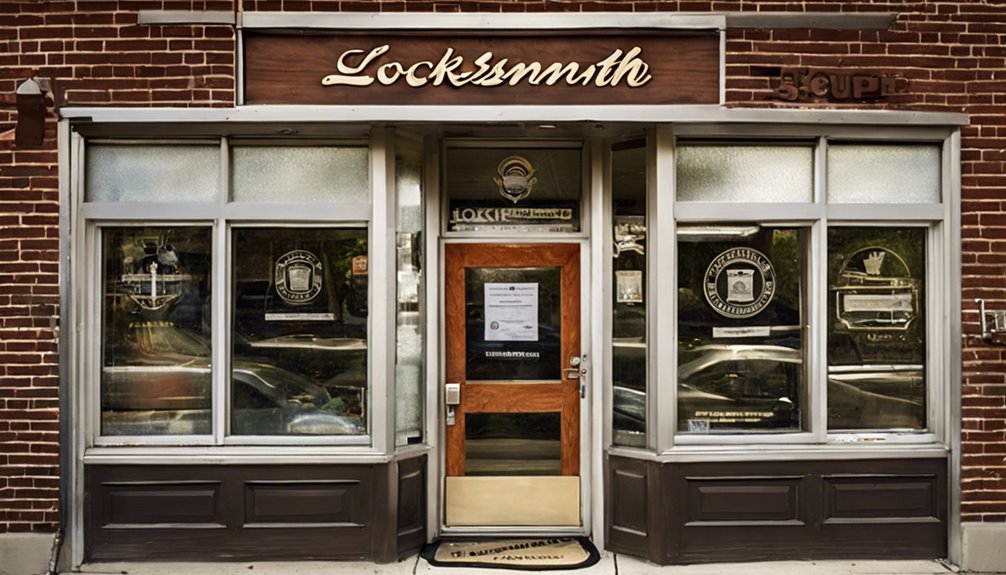
Locksmiths operating in New Jersey must adhere to specific business licensing obligations to confirm compliance with state regulations.
These obligations are designed to guarantee that your locksmithing practice operates with legality and transparency, which in turn, elevates public trust in your services. Understanding and meeting these requirements is essential for a successful business.
Here are key licensing obligations you should be aware of:
- Business Office: Maintain at least one business office within New Jersey. If you don't have a physical office, file a statement with the Committee and provide a power of attorney.
- Vehicle Markings: Clearly mark the outside of your service vehicles with your business name and contact information as per N.J.A.C. 13:31A-1.13.
- Emergency Services: If you offer electronic security systems, ensure an emergency service number is available 24/7, and respond to emergencies within 24 hours.
- Insurance Requirements: Retain general liability insurance covering at least $500,000 and obtain a $10,000 surety bond approved by the Department of Banking and Insurance.
Criminal History Background Checks

If you're applying for a locksmith license in New Jersey, understanding the criminal history background check process is essential.
You'll need to undergo fingerprinting and submit to a review by the Criminal History Review Unit, ensuring any unexpunged misdemeanors or felonies are disclosed.
Keep in mind that previously expunged records may impact your eligibility, so awareness of your legal standing is vital.
Background Check Requirements
When applying for a locksmith license in New Jersey, you'll need to undergo a Criminal History Background Check once your application receives preliminary approval. This process is essential to guarantee that applicants meet the state's eligibility requirements.
Here are the necessary steps to complete the background check:
- Submit fingerprints to the Criminal History Review Unit.
- Complete and sign a Certification and Authorization form in the presence of a Notary Public.
- Follow instructions provided by the Advisory Committee after your application is preliminarily approved.
- Prepare for a thorough review of your criminal history records.
The check primarily reviews your criminal history, including any misdemeanor or felony convictions, pending criminal cases, and information from the sex offender registry.
Depending on the situation, this may encompass both state and national records. It's important that all background checks comply with legal standards to maintain fairness in hiring practices, particularly under New Jersey's Ban the Box law, which aims to guarantee individuals have an opportunity for employment regardless of their past.
Record Expungement Considerations
Understanding the implications of criminal history background checks is essential for any locksmith pursuing a license in New Jersey, particularly concerning record expungement. Your eligibility for expungement hinges on your entire criminal record, including all prior arrests and convictions.
Generally, you can apply for expungement after ten years, provided you haven't been convicted of any crime during that time and that you've limited disorderly person offenses to no more than two.
New Jersey's Clean Slate Law allows for the expungement of convictions over ten years old, though serious offenses like murder or manslaughter are excluded. You must disclose all offenses, even juvenile or out-of-state, in your petition.
An important aspect to remember: once your record is expunged, employers can't access it through background checks. Consumer Reporting Agencies (CRAs) must omit these records, meaning they can't factor into hiring decisions.
Employers need to conduct individualized assessments and guarantee compliance to avoid legal penalties. Consequently, understanding these nuances in the record expungement process can greatly enhance your employment opportunities within the locksmithing field.
Continuing Education Standards

While maintaining your locksmith license in New Jersey, it's crucial to adhere to the continuing education standards set forth by the Fire Alarm, Burglar Alarm, and Locksmith Advisory Committee. These requirements guarantee you're up to date with the latest industry practices and legal standards.
You must complete between 24 to 52 hours of continuing education every three years, with a renewal deadline on August 31 of the renewal year. The specific education hours break down as follows:
- 2 hours in the Barrier Free Subcode
- 2 hours in the New Jersey Uniform Construction Code
- 2 hours in the Americans with Disabilities Act Code
- 2 hours in Industrial Safety
Additionally, you need to complete a minimum of 3 hours in Smoke Detection Systems if you hold a Burglar Alarm License.
Importantly, only 10 of the required hours may be completed online. The courses must be approved by the Advisory Committee, with topics relevant to your practice.
Remember that if you obtained your initial license during the triennial registration period, you're exempt from these requirements.
Compliance isn't optional; failure to meet these standards could hinder your license renewal or reinstatement. Furthermore, if you hold an out-of-state license and that state lacks continuing education mandates, you still need to meet New Jersey's standards.
Stay proactive in your education to guarantee your continued licensing and broaden your expertise in the locksmith field.
Frequently Asked Questions
Can Locksmiths Provide Services Without a License in New Jersey?
No, you can't provide locksmith services without a license in New Jersey.
The state strictly mandates licensing to guarantee safety and professional standards.
If you operate unlicensed, you risk hefty fines, up to $10,000 for a first offense and up to $20,000 for subsequent violations.
The Advisory Committee actively pursues unlicensed locksmiths, so it's not just about compliance; it's about protecting your business and reputation in the industry.
What Happens if a Locksmith's License Expires?
If your locksmith license expires, you risk automatic revocation after one year.
While you can renew after April 30, doing so incurs late fees, and practicing without a valid license could lead to penalties.
If you don't submit a renewal application within 30 days post-expiration, you face suspension.
To reactivate your license, be prepared to meet any education or training requirements set by the Committee, which ultimately controls restoration decisions.
Are There Any Exceptions to the Age Requirement for Locksmiths?
Did you know that about 10% of the population works in licensed professions?
If you're considering becoming a locksmith, you'll need to be at least 18 years old. Unfortunately, there aren't any exceptions to this age requirement.
This strict rule guarantees that all applicants are legally able to undertake the responsibilities that come with a locksmithing license.
Make sure you meet this criterion before proceeding with your application.
How Can I Verify a Locksmith's License Status?
To verify a locksmith's license status, you can start by checking the New Jersey licensing verification website for their license number.
You should also contact the Fire Alarm, Burglar Alarm, and Locksmith Advisory Committee.
Additionally, confirm that the locksmith has a valid business license and guarantee they hold the appropriate license type for the services they offer.
It's essential to check their issue and expiration dates for full compliance.
What Penalties Exist for Unlicensed Locksmith Operations?
Did you know that unlicensed locksmith operations can lead to fines up to $20,000 for repeat offenders?
If you operate without a license, you're risking significant monetary penalties, including potential denial or revocation of your license.
You'll also face administrative actions, civil litigation, and may become ineligible for future licensure.
It's essential to understand these penalties to protect your rights and business interests while maintaining compliance with state regulations.
Conclusion
To sum up, understanding the employment laws for locksmiths in New Jersey is essential for both aspiring locksmiths and employers. Notably, over 70% of locksmiths report that their licensing and training have positively impacted their business success. By adhering to regulations such as licensing, supervision, and safety standards, you'll not only comply with the law but also enhance your professionalism and trustworthiness in the field. Staying informed about these key regulations helps foster a safer and more reliable locksmith industry.






